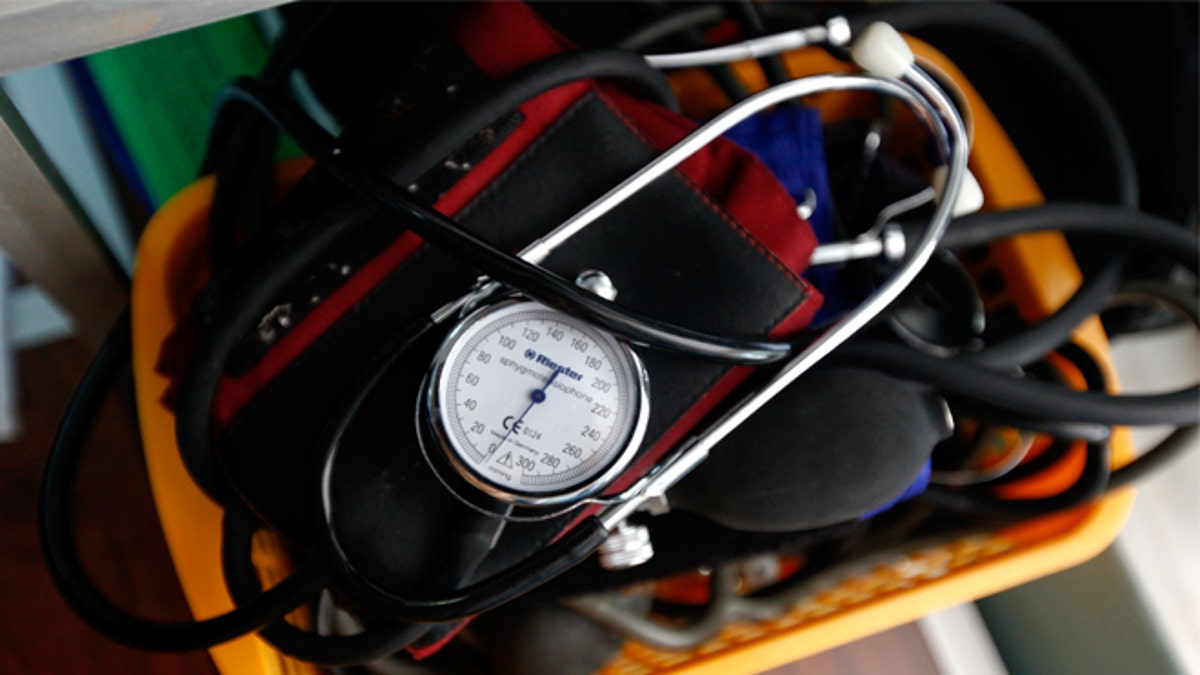
A blood-pressure machine is seen inside a basket with other medical devices (REUTERS/Yorgos Karahalis).
Young adults may be able to ward off cardiovascular disease later in life by paying more attention to their blood pressure levels, according to a new research from Northwestern Medicine.
In a study published in the Journal of the American Medical Association, researchers found that people who have moderate to slightly elevated blood pressure levels at age 18 were up to two to four times more likely to develop a significant risk of heart disease by age 50.
Previous research has indicated that elevated blood pressure is a strong risk factor for the development of heart disease. But, according to lead study author Norrina Allen, many of those studies focused only on blood pressure readings taken at a single point in time, among middle-aged or senior populations – groups that already have a high risk for heart disease.
“We know blood pressure changes throughout an individual’s life, so the question in this study was: What are the patterns in blood pressure changes among [people of] younger ages? And how are those patterns associated with heart disease development?” Allen, assistant professor of preventive medicine at Northwestern University Feinberg School of Medicine, told FoxNews.com.
Using data gathered from 4,681 participants in the Coronary Artery Risk Development in Young Adults Study, researchers tracked blood pressure levels among participants over the course of 25 years – from when they were 18 to 25 years old through middle age.
Among study participants, the researchers identified five blood pressure patterns: people with consistently low blood pressure (105/65 mmHg); people with consistently moderate blood pressure (110/65 to 68 mmHg); people with moderate blood pressure levels that increased to prehypertension levels (140/90 mmHg); people who had consistently elevated blood pressure (around (140/90 mmHg); and, people who had elevated blood pressure that increased with age (up to 150/90mmHg).
Overall, young people with consistently elevated blood pressure were four times more likely to develop hardened arteries and cardiovascular disease by age 50, compared to those with consistently lower levels; and people with moderate blood pressure that increased with age were at a 2.5 times greater risk.
“We know blood pressure in and of itself, even at a single point in time, is a strong marker of heart disease risk and this study shows cumulative blood pressure adds up over time and we looked over 25 years,” Allen said. “That’s a long time to be putting a lot of strain on your heart, it’s that cumulative effect.”
While the researchers are not advocating placing young people with moderate or slightly elevated blood pressure levels on medication, they hope physicians will start advising young people on lifestyle modifications that will help keep their blood pressure within a low-to-moderate range for life.
“The beauty of diet and physical activity is we know they have an impact on blood pressure,” Allen said. “They are the first line of defense for reducing risk of heart disease.”
The researchers will continue to monitor this group of participants to see how their blood pressure patterns affect their health as they continue to age.
Next, they hope to study the best ways to prevent certain high risk groups from experiencing a continued increase in blood pressure levels as they age.
“I hope people start to be kind of aware of these risk factors earlier in life and not wait until they are 50 years of age to say, ‘I should decrease my blood pressure,’ but to prevent it in the first place,” Allen said. “I think ultimately the goal is prevention.”
